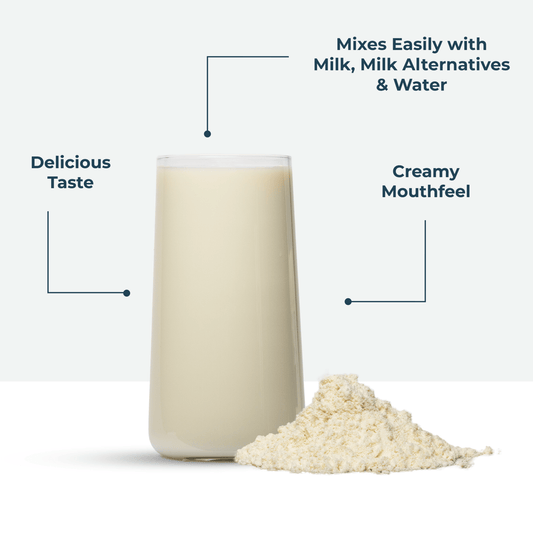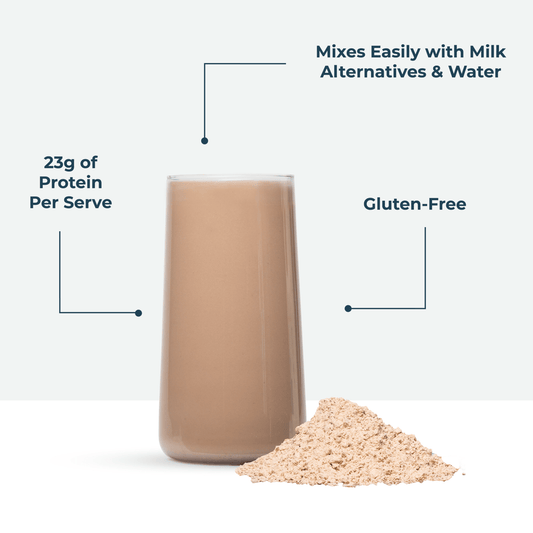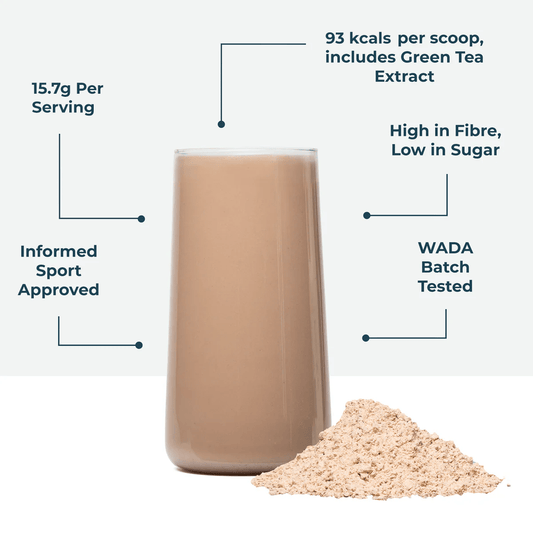What's the Difference Between Whey Protein & Lean Protein Powder?

Incorporating additional sources of protein into your diet can have a big impact on your training - whether you’re a pro athlete or a regular gym enthusiast. But, it’s essential that you understand which type of protein powder is right for your individual needs.
In this article, we’ll explore the primary differences between whey protein and lean protein powders, and how they can both affect the way you train.
What is lean protein?
Firstly, however, it’s vital to understand what we mean by lean protein. Proteins are composed of amino acids, which are key building blocks within the body, helping to manage everything from hormone creation to muscle synthesis.
Whilst the body can create the majority of these internally, what are known as essential amino acids have to come from our diets - by consuming and digesting different protein sources. Dietary protein sources can include meat and fish, eggs and dairy, and various plant based sources like legumes.
Alongside their protein content, these foods can be rich in other micro and macronutrients - which is where the primary distinction between lean protein and regular sources comes from.
The descriptor of lean is typically used for high-protein foods which are low in saturated fats and lower in calories. This includes white meat like chicken, white-fleshed fish like cod and haddock, and pulses like beans, peas, and lentils. If you’re maintaining a calorie controlled diet, lean proteins can help you stay full and eat a varied diet whilst still working towards your goals.
Are protein powders a type of lean protein?
But where do protein powders fit into this?
As an isolated supplement, protein powders can be a useful dietary tool for everyone from weekend warriors to professional athletes.
According to research, protein supplementation can assist with body fat reduction when part of an active lifestyle (2), and is linked with increased strength and mass when used alongside resistance training (3). This is because protein powders are an excellent tool in supporting protein intake. Protein powders like whey are also rich in important amino acids like leucine, which has been linked to protein synthesis and muscle building (4).
But do they strictly fall into the definition of lean protein? This is not as simple to answer.
Whey protein, from which many of the current protein powders on the market are derived, also contains fats and carbohydrates. Depending on the way it’s processed, the resulting protein powder will have different levels of these other macronutrients, which will impact on whether they can be categorised as lean protein sources (5).
Which whey protein powders can be considered lean?
Throughout this article, we’ve explored lean proteins, but where do whey protein powders stand within this concept?
Whey is a naturally occurring substance found in milk, and is typically separated from the more abundant (and solid) casein during the cheese manufacturing process. From here, whey can be processed in a variety of ways to create whey protein powders. But it is this processing that has the biggest effect on whether a protein powder can be considered lean or not.
Whey protein concentrate
During manufacture, whey can be processed into whey protein concentrate (WPC). This powder can then be ultrafiltered and diafiltered to have various protein concentrations, which have different applications within the food industry.
For example, WPC35 (whey protein concentrate with a protein content of 35%) is often used in yoghurts, infant formula, sauces and stews. Alternatively, WPC80 (where the protein content stands at 80%) is more frequently used in protein powders for supplements because of the high-protein to low-carbohydrate ratio (6).
Importantly, whilst whey protein concentrate is naturally higher in calories and fats than whey isolate (see below), the primary advantage is that it’s micro and macronutrient-rich, which can have additional health benefits (7). This means that even if whey protein concentrate is considered less lean, there are still advantages to incorporating it into your training.
Our Whey Protein
At Kinetica Sports, we have a fantastic range of whey protein powders that use a combination of whey protein concentrate and whey protein isolate to help you on your fitness journey.
Learn More - Kinetica Sports Whey Protein
With 22g of protein, 5.3g of BCAAs, and only 2g of fat per portion, our Whey Protein Powder at Kinetica Sports is an excellent addition to your workout regime.
Whey protein isolate
Compared to whey protein concentrate, whey protein isolate (WPI) is further filtered to elevate the protein content - usually to around 90% or more. During this process, a large portion of the lactose, fat, and mineral content is removed. This makes whey protein isolate technically more lean as a protein supplement component by removing much of the fat content whilst still maintaining a high protein percentage.
Interestingly, since the extra processing removes a large portion of the lactose, WPI can be a more suitable option for those with lactose intolerance or lactose sensitivity (but not a milk allergy).
Our clear whey protein
In order to get the characteristic clearer appearance, our clear whey uses whey protein isolate that has undergone further purification and acidification under a lower pH.
With 24g of protein, 4.5g of carbohydrates, and only 0.2g of fat per serving, our clear whey protein is an excellent complement to dietary protein needs. The refreshing taste makes it a delicious option for those who struggle with their appetite after training too.
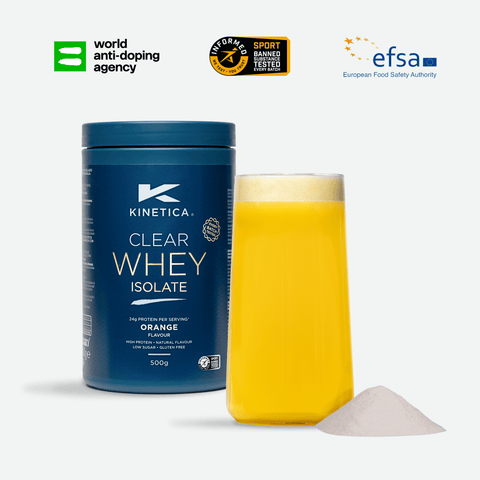
Learn More - Clear Whey Isolate
With regards to leanness specifically, our Kinetica Clear Whey Isolate has a lower fat and higher protein content compared to regular whey protein powder.
Lean whey protein: the best of both worlds?
In a direct comparison, whey protein isolate would be considered the leaner protein source because of the lower fat:protein ratio. However, given the quality of the blends we use, any of our protein alternatives would be considered a lean protein option and therefore an excellent tool for anyone looking to support their health, recovery or protein needs.

Learn More - Kinetica Sports Lean Active Protein
At Kinetica Sports, our Lean Active Protein has a blend of whey protein concentrate and isolate to make a protein-rich, low-sugar formula that will add another dimension to any training programme.
Are plant-based proteins a type of lean protein powder?
We’ve primarily focused on whey based protein powders in this article, but it’s worth noting that plant-based protein sources can also be considered lean. Typically made from pea, rice, soy, or other ingredients, plant-based protein powders are naturally lower in fat, whilst still maintaining a protein-rich composition.
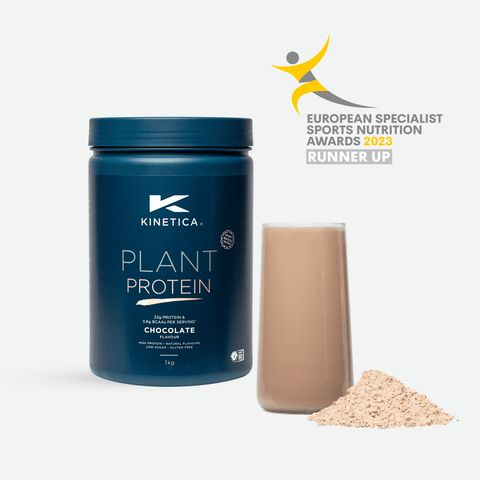
Learn More - Kinetica Sports Plant Protein
Plant proteins are also often combined to create a more complete protein mixture because most plant sources are high in some amino acids while being lower in others. A blend of plant proteins therefore covers the shortfalls of one another (8). For more information about plant-based protein powders, check out our article on What are the Benefits of Using Plant-based Protein Powder?
Choose Kinetica Sports for your Training Supplements
At Kinetica Sports, we understand that people have different drivers and ambitions. Whether you’re an Olympian, a weekend warrior, or simply looking to get fitter, our goal is to support you throughout your workout journey with exceptional nutritional supplements.
Learn more from the Kinetica Sports blog, where we have plenty of advice, information, and even recipes to give you inspiration for healthy and delicious meals!




